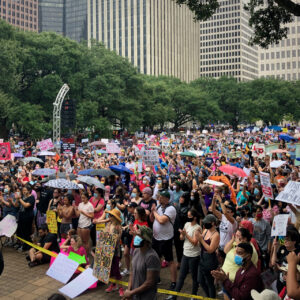
A crowd of thousands at City Hall in Houston. Photo by John Griswold
A would-be participant in the Houston Women’s March for reproductive and voting rights stood in a line of three dozen people waiting to pay to park on Saturday morning, in a lot next to Minute Maid Park and a Catholic women’s prep school. She was dressed as a handmaid, from the TV adaptation of The Handmaid’s Tale, despite pleas from organizers that there be no such imagery, because it “continues to create more fragmentation, often around race and class, because it erases the fact that Black women, undocumented women, incarcerated women, poor women, disabled women have always had their reproduction controlled in this country….” It was overcast and starting to drizzle.
By the time the woman in the red cloak and bonnet, and the others in line, made it to Discovery Green, a public space in downtown Houston, the marchers had long left for City Hall, and it was starting to rain. A policeman on the Green apologized for the temporary fencing everywhere and said there were several events going on, including a dog show. He did not seem aware of the significance of the march, which national organizers had said in an email would have “650+ Sister Marches nationwide [in what] could be the largest single-day mobilization dedicated to abortion justice and reproductive freedom in history.”
The local organization’s website said, “The Houston Women’s March will serve as a peaceful protest of dire current events in Texas, including Senate Bill 8, which is tantamount to an unconstitutional ban on abortion; recently passed voter suppression laws; redistricting measures; discriminatory proposals harming the trans community; the inhumane treatment of immigrants along the border and throughout the state; attacks on Asian Americans; and so much more.”
Texas is the epicenter of a move to overthrow Roe v. Wade. Senate Bill 8/House Bill 1515 was signed into Texas law on May 19 by Governor Greg Abbott, and went into effect September 1. The bill is referred to as the “Texas Heartbeat Act,” because it bans abortions six weeks after conception (the first such ban in the US) or after a heartbeat is detected. Rape and incest pregnancies do not qualify for exemption.
GOP lawmakers tried to get around constitutionality by keeping enforcement out of government hands; instead, any member of the public can bring a civil lawsuit against anyone who performs or aids in an abortion—even, say, an Uber driver who takes a woman to a clinic. The private citizen can be authorized “statutory damages,” to include court costs, attorney fees, and at least $10,000, if they win the suit. For this reason, the apparatus of the bill has been compared to a bounty process, and its would-be plaintiffs to authoritarian-state informants.
At Houston City Hall, a mile north, the marchers were listening to speakers such as Padma Lakshmi and Gail Simmons from Top Chef and more than a dozen politicians and activists, including Houston Mayor Sylvester Turner, US Representative Al Green (D-Texas 9th District), and US Representative Sylvia Garcia (D-Texas 29th District). Several invoked the names of important Texas women in the battle for reproductive rights, such as Sarah Weddington, the attorney for “Jane Roe.”
Several thousand women and men waved signs and cheered a speaker who said the GOP professed to care greatly about the economy, but the restrictive legislation would “kneecap 47% of the US workforce, especially women of color, and put more of them in debt, having devastating effect on the GDP for all.” She said the state GOP’s efforts to redistrict the voter map was meant to “whitewash” the state and ignored that “95% of new growth has been people of color,” in order to maintain power. She said conservative lawmakers believe “wearing a mask across one’s face is an abomination of personal rights, but of course having half your state’s population physically undergo pregnancy and childbirth against their will isn’t an abomination of those same rights!” The crowd roared.
A director at the Texas ACLU said, “This is a culture war, led by extremist lawmakers. It’s about a steady chipping-away at our rights and our ability to stop it before it’s too late. That’s why we have to speak up about abortion and voting. That’s why everyone here [has] to speak about this to [your families], your friends, your clergy, to the people around you. That’s why we have to vote for leaders who are committed to protecting abortion without exception.”
US Representative Garcia said she had left for a few minutes to do an interview with CNN, and “CNN now knows that we’re 10,000 strong in the rain and we’re here to stay!” (One Houston paper counted 20,000 participants.) But it was raining harder, and by 11:00 am it started pouring just as the founder of Hoochies for Houston began to speak, with her Spanish-language translator. Cops on the steps of City Hall tried to shelter under a branch from a live oak, and half the crowd was leaving. There were more speakers and musical acts planned, but at 11:30 organizers called it.
March-goers sheltered in the windows of One Shell Plaza, as others ran past in the tropical downpour. The wind blew wildly, and some trudged along, knowing they were committed to walking to their cars, in some cases a mile away. Others used their signs to protect their heads from the rain, and one woman ran past, fist upraised, exhilarated. “Woohoo!” she shouted.
